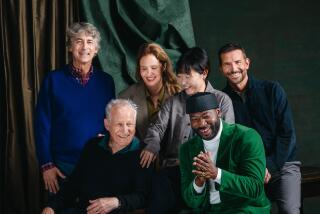WORLD CUP ’90 : Shootout Evokes Saddest Words in Any Language
FLORENCE, Italy — It is not a particularly perceptive quality to be able to recognize suffering, whenever and wherever one happens upon it. It does not take much skill to understand heartbreak, in any language.
Certainly in the civilized world there are far more urgent matters than the outcome of a game of soccer. With human lives and belongings lost amidst rubble from the earthquake-ravaged hillsides of Iran to the fire-scorched homesteads of Southern California, it would be unpardonable for anyone to attempt to convey as heart-wrenching the disappointment of a group of grown men who spent the day Saturday in the sunshine, kicking a ball.
Still, when I saw the pain in some of these faces, it made me wince.
I looked out onto a soccer field and could see Dragan Stojkovic, stretching his sweat-sopped shirt up over his face, hiding inside it like a turtle retreating into a shell. He felt shame. His kick for Yugoslavia in a World Cup overtime shootout thumped off a goal post, even though the Argentine goalkeeper, having lunged the wrong way, left the enormous net behind him completely free.
And then I saw Dragoljub Brnovic, doubled up in pain rocking back and forth in the grassy pitch of Florence’s soccer stadium, distraught in the knowledge that his own similar mistake gave Argentina an opportunity to win the game.
And then there was Faruk Hadzibegic, with one last chance to keep his country in the running for a prize more precious to its people than any other. And his shot was stopped. And the match was done. Robert Prosinecki, a teammate, threw the plastic water bottle in his hand as far as he could. And Tomislav Ivkovic, the Yugoslav goalkeeper, collapsed, covering his eyes with his hands.
The players didn’t know what to do, where to go, how to react. For Zlatko Vujovic, instinct took over. Soccer tradition dictates that opponents swap jerseys after a game, if they share a mutual respect. Vujovic rushed toward Diego Maradona, Argentina’s near-legendary leader, and peeled off his shirt, extending it toward him. Maradona, touched by the gesture, did likewise, then patted the Yugoslav on the cheek.
For 120 minutes they played, baked by a sun that must have inspired Dante to write about his Inferno when he lived here. They played before singing, chanting, flag-waving, bottle-heaving soccer fans, none of whom seemed to care that neither team could kick the ball into the goal. Yugoslavia at least had an excuse, playing one man short because of a penalty. Yet that was hardly comforting, not during the game, not after it.
It is one thing to play for your country and be defeated. It is quite another to be defeated in a series of one-on-one confrontations as dramatic as a matador against a bull, knowing that everyone you know, and everyone you don’t know, back home is probably on his or her knees, praying for your success, crushed by your failure.
While others waited for Maradona and what he had to say, I searched for players from the losing team. They were not so easy to find.
A potted plant went flying. The large vase smashed against the wall, leaving a foot-high mound of dirt on the hallway rug. Two unhappy Yugoslav journalists pretended not to notice it, pretended not to have been at fault as they stepped across it. This loss was their loss as well.
What was there for the players to say at such a time? That they played well? That they tried hard? That they were unlucky? Any fool could see as much.
One of Yugoslavia’s players, Davor Jozic, came by. Through an interpreter, I managed to express a measure of sympathy. Jozic shook his head.
“It is a pity to lose,” he said, “but a far greater pity to lose like that.”
Zoran Vulic was next. He held tightly onto a can of soda, kept his eyes on the floor. I asked if he thought Argentina could win the World Cup now, repeat as champions.
“Argentina,” he said, “it is a good team. But a good team needs good luck to play.”
The interpreter paused. Vulic looked up, with sad eyes, and spoke again in Serbo-Croatian. The interpreter nodded, then repeated it to me.
“He says, ‘As you can see by what happens to us today.’ ”
I shook the player’s hand, stepped into a hallway. There was another Yugoslav, leaning against a wall, saying nothing. I did not wish to be rude, but, being unable to identify him by any other means, I peered at an ID badge dangling from his neck. It was difficult to read. Suddenly he snatched it with one hand and held it up in front of my face.
Faruk Hadzibegic, too, did not mean to be rude. As one of the men who missed shots in the shootout, who cost Yugoslavia its chance to advance, he was simply tired and cheerless and upset.
“It is a very painful thing, to lose this way,” he said. “We played very well, as did Argentina. The shot I took, it is too late now. I cannot take the shot a second time. If I could, I would kick it into the goal.”
He thought about this a moment.
“It was not such a good kick, was it?” Hadzibegic asked.
I shrugged a shoulder, not knowing how else to respond.
“I think not,” he said.
Sad faces will appear before me from time to time, on occasions far more meaningful or merciless than this. But will I ever see a sadder one? I think not.






